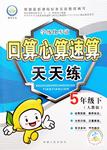题目内容
.______, I’m in favour of your plan.
| A.Honest speaking | B.Honestly spoken |
| C.Honestly speaking | D.Honest to speak |
A
解析

 学练快车道口算心算速算天天练系列答案
学练快车道口算心算速算天天练系列答案Mr and Mrs King have two children, Jim and Liz. The whole family are all busy, so they often leave notes to each other. Read these four notes today to know something about them.
|
3:30 p.m. To dad and mum, Mr. Brown rang. No football practice today. I’m going to Tom’s house to plan our project and be back at 5:00pm. Liz |
4.00 p.m. To Liz, It’s your turn to walk the dog. I have to do my homework after school. Remember to play with Teddy when you get home ! Jim |
|
6:45 pm Has anyone seen my tennis shoes? I’m in my bedroom doing my homework, and I need to wear them tomorrow. Jim |
10.00 p.m. I saw your tennis shoes this morning. They smelt terrible so I put them outside the back door. Good night, dear! Mum |
1.Liz will be back home at ______.
A.3.30 p.m. B.4.00 p.m. C.5.00 p.m. D.10.00 p.m.
2.______ should walk the dog today.
A.Liz B.Mrs. King C.Jim D.Mr. Brown
3.Jim was _______ at 6.50 p.m.
A.practicing football B.going to Tom’s house
C.playing tennis D.doing his homework.
4.Jim can find his tennis shoes ______.
A.in his bedroom B.outside the back door
C.in the living room D.at Tom’s house
第二节 书面表达(满分25分)
假如你叫华华,进入高三后一直想买一个MP3,但是母亲反对。请你根据下表中的信息,给妈妈写一封信,说服她满足你的愿望。
|
使用MP3的目的 |
承诺 |
|
1.听语文、英语课文录音 |
1.只在课外学习疲劳时和睡觉前听 |
|
2.偶尔听音乐放松大脑 |
2.作为回报,多做家务 |
注意:1.可适当增加细节,以使行文连贯;
2.词数100左右。开头及结尾已给出,不计入总词数。
Dear Mum,
As I’m in Senior 3, I strongly feel the urge to get an MP3 player, so I’m writing to you.For one thing,
____________________________________________________________________________
_______________________________________________________________________________
Hope you’ll satisfy this request of mine.
Yours,
Hua Hua